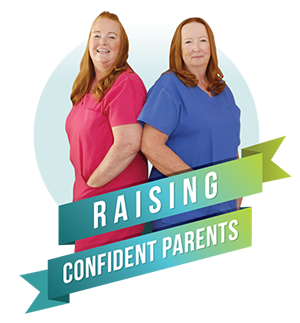Congratulations! Your baby is here, and the fear of labor and delivery is behind you. To help you be as comfortable as possible while you are in the hospital, here are some tips from an old postpartum nurse. Now let’s get you back on track and ready to take your baby home.
- If you had a C-section, you may experience horrible shoulder, neck, and upper-chest pain. Nobody tells you about this possible pain, and you may feel like you are having a heart attack. It is caused by gas bubbles trapped under the skin when your belly was opened up. I (Pam) have found that heat and gas medications, such as Milk of Magnesia are the only things that help. The nurses can give you little heat packs, but they don’t last long, so bring a heating pad from home. You may not need it, but if you do, you will thank me.
- Wear a tight sports bra 24 hours a day to help with engorgement.
- Do not allow hot shower water to run over your breasts, as that may increase engorgement.
- Do not pump your breasts; this will only make the engorgement worse.
- Apply ice packs or ice diapers for 20 minutes at a time. At home, wet diapers and freeze them.
- Use an anti-inflammatory medication such as ibuprofen.
- Drink some sage tea, which will inhibit milk production.
- If you do not have a sulfa allergy, use cold cabbage leaves, which can reduce swelling and inflammation. Wash the cabbage leaves and break the veins. Place the cabbage in your bra (use an old one as it may stain) and keep it on your breast for a couple of hours or until the cabbage wilts. If your breast becomes red and painful or you develop flu-like symptoms and a fever, call your doctor.
If You Are Breastfeeding
Keep your baby on your chest, skin to skin, as much as possible. Don’t let nurses give the baby bottles if you plan on continuing to breastfeed. I (Pam) would rather see them use a Soothie pacifier to help calm the baby. Some babies’ stomachs will stretch too much if they are also bottle-fed in the first few days, which can make breastfeeding a lot harder. If, however, the baby’s blood sugar is low or the baby will not latch, then the baby should be given formula. Babies need to be fed 10 percent of their weight in ounces. If you want or need to give formula, you can ask to do a finger feed using a supplemental feeding system.
You can also set up a supplemental feeding system to your breast that will give your baby a little formula while nursing.
Remember, during the first three days, a baby’s belly is very tiny. Most babies only need the colostrum produced by the mom to keep them satisfied. Most women usually feel better in 24 to 48 hours, but during that time, the pain can be severe.
- Take advantage of your postpartum nurses. Ask the nurse to make you ice diapers and teach your partner how to make them for your sore bottom. Open the diaper at the top of the end with the tabs. Tunnel your fingers through the middle of the diaper to form a pocket and fill it with ice. Then use the tabs to close the diaper. These work much better than ice packs and last so much longer.
- If you have hemorrhoids, ask your nurse for Tucks cooling pads and hemorrhoid cream. Put the cream on the Tucks, place it against your hemorrhoids, and leave it there. Filling a glove with ice and placing it against the Tucks can also help. Do not put the ice glove directly on the skin.
- Ask your nurse for soothing nipple gels, which help sore nipples to heal. When you get home, store them in the refrigerator—the coolness will relieve nipple pain.
- Ask for milk of magnesium (or bring some) for the day after delivery and take it in the morning and before bed to prevent constipation. The nurse can give you Colace pills, but they don’t work as well. Whether you had a vaginal delivery or a C-section, you do not want to be straining to have a bowel movement. My sister brought me White Castles, and oh boy, did that help!
If You Are Bottle Feeding
- Tell your doctor if you have a family history of milk allergies or lactose intolerance, and watch the baby for allergies to the formula. The symptoms can include constipation, diarrhea, vomiting, distended stomach, blood in the stool, difficulty breathing, hives, crying, sleepiness, and an unwillingness to eat.
Pumping
- We encourage moms to start pumping as soon as possible if the baby is not latching well. You can start while you are still in the hospital, then take that pump kit home with you. Don’t forget the tubing on the machine because you can’t buy it separately. Make sure the nurse observes you as you pump and checks that the flange is the right size for your nipples. If needed, the nurse can give you a bigger flange.
Tip: Talk to your insurance company before you go to the hospital. The Affordable Care Act requires that most health insurance plans cover the cost of a breast pump (see www.HealthCare.gov for details). Make sure to take advantage of this coverage if you plan on breastfeeding.
You can also rent a pump from the hospital, if needed. Especially with twins, you should start pumping every three hours (put the baby to breast and then pump) to increase your supply and bring in your milk. If your baby is not nursing very well to begin with, pumping will help decrease engorgement. If the engorgement is uncomfortable, use a warm, wet diaper on your breast for 10 minutes before a feed, and then apply cold for 20 minutes after a feed. Think of the first three days as practice. Don’t get frustrated or discouraged; it is not as easy in the beginning as some people say. If exclusively breastfeeding, infants should be given a vitamin D supplement—be sure to discuss this with your doctor. You can start giving vitamin D when you and your baby go home.
Parent tip: “Get as much rest as you can while in the hospital. I recall being exhausted, not having a clue why someone allowed me to take this helpless child out of the safety of the hospital while still trying to work out how to nurse my three-day-old. The nurse asked her name—I couldn’t remember for a few seconds… I was so tired!”
—Donna P. Plainfield, Illinois
While in the hospital, have the nurses take the baby to the nursery from time to time, especially at night, so you can sleep for a few hours. You can then have them bring the baby back to you to be fed. Nurses may tell you they cannot take the baby if you are breastfeeding. However, if you need to sleep, then insist. They may say that the baby needs to stay so you can learn your baby’s cues, but you also need good sleep to be healthy so you can care for your baby. Some nurses won’t want to keep bringing the baby back and forth for feedings. However, rest is essential for both you and your baby.
Sore Nipples
Get lots of nipple cream from Whole Foods and use it right away (lanolin from the hospital does not always work). Make sure the nurses are watching you get your baby latched. A poor latch can cause severe damage to your nipples, making breastfeeding very difficult.


